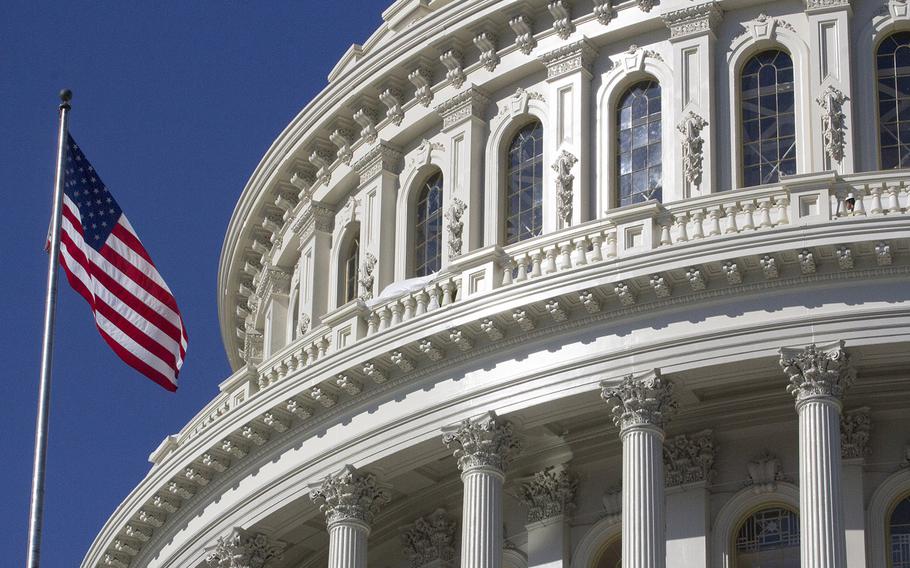
(Stars and Stripes)
WASHINGTON — The Department of Justice raised concerns over the weekend that legislation designed to make it easier to dismiss poor-performing Department of Veterans Affairs employees could be unconstitutional, VA leadership testified Wednesday to Senate lawmakers.
Yet, Jennifer Lee, a VA deputy undersecretary for health, told the Senate Veterans’ Affairs Committee during a hearing Wednesday afternoon that the VA would support bill S. 1094, the VA Accountability and Whistleblower Protection Act, with a few technical changes.
“We are very happy with the aims of it,” said Meghan Flanz, acting general counsel at the VA. “We did over the weekend receive some concerns from our colleagues in the DOJ with a couple of minor edits to avoid constitutional issues.”
The portion of the bill that caused concern at the Justice Department was similar to the issue that a federal court deemed unconstitutional earlier this month in a lawsuit filed against VA by a fired employee. The U.S. Court of Appeals for the Federal Circuit upheld a petition May 9 from former Phoenix VA Medical Director Sharon Helman, who was fired following scandal in 2014 when whistleblowers disclosed veterans seeking care in Phoenix were languishing on secret wait lists. The process used to dismiss her was established that year through a large VA reform bill. The court said the VA’s actions against Helman violated the appointments clause of the constitution.
Legislators have been attempting for years to pass measures to allow the VA secretary to have more authority in firing bad workers. The bill is seen by many lawmakers and veterans organizations as a way to root out a perceived culture of corruption at the department -- an issue President Donald Trump has upheld as the main problem plaguing the VA.
The new bill, introduced in the Senate two months after the House passed its version, has been lauded as Congress’ best opportunity to pass VA accountability legislation.
“For two years this has plagued this committee and the VA,” said Sen. Johnny Isakson, R-Ga., chairman of the committee. “We have all come together. We worked through some thorny issues. We navigated some rough seas.”
It was not clear Wednesday when the bill would be altered to ensure it’s constitutional. If the committee advances the bill and it’s approved by the full Senate, the revised version would be sent back to the House for a vote.
“I am hopeful we will see this bill signed into law soon so our veterans will be more likely to receive the quality health care they earned and deserve,” said Sen. Marco Rubio, R-Fla., one of the bill’s sponsors.
About a dozen major veterans organizations have publicly supported the bill in addition to the Project on Government Oversight and Office of Special Counsel. However, the American Federation of Government Employees, a large federal union, argued Wednesday that the bill would undo workforce protections.
The Senate bill, like the one that passed the House, would shorten the time that VA employees would have to appeal any disciplinary action against them and require quicker determinations from the Merit Systems Protection Board, which hears the appeals. The bills would also allow the VA secretary to reduce the pension of a VA employee and recoup bonuses and relocation expenses in certain instances.
Further, the Senate bill includes a compromise on a controversial segment of the House bill that would eliminate grievance procedures for employees. The elimination of grievance procedures caused some Democrats to vote against it. The Senate bill would maintain the procedures but place limits on how long they could last.
The legislation also lessens the evidentiary standards that the VA is required to meet to uphold decisions to fire VA employees. Flanz said, for example, the change would’ve made it easier to remove a VA mental health care provider who was caught by a veteran patient in April watching pornography on his iPad. Though the employee admitted to watching pornography and there was photographic evidence, the VA had to spend time gathering more evidence before they could remove him, Flanz said.
“This would allow us to get to the decision state faster,” she said.
The VA and the bill’s sponsors tried to alleviate the union’s concerns that the bill would allow for at-will firing of rank-and-file employees.
“I know the majority of the people at the VA are… passionate about the work,” Rubio said. “Nothing in this bill is designed to punish them or stigmatize them.”
The American Federation of Government Employees, a union representing approximately 220,000 VA workers, described the bill as “regressive” and a “horrible mistake.” In a quip alluding to President Donald Trump, union President J. David Cox spoke against creating a culture of solving problems by telling workers, “you’re fired.”
“The innocent will be fired without cause. The appeals will be a humiliating joke, and the executives will continue to ruin the lives of workers and hurt veterans,” Cox said. “It’s about ‘you’re fired’ as an easy way to shift blame from executives onto the rank-and-file. We have before us a bill that wrecks the civil service.”
wentling.nikki@stripes.com Twitter: @nikkiwentling